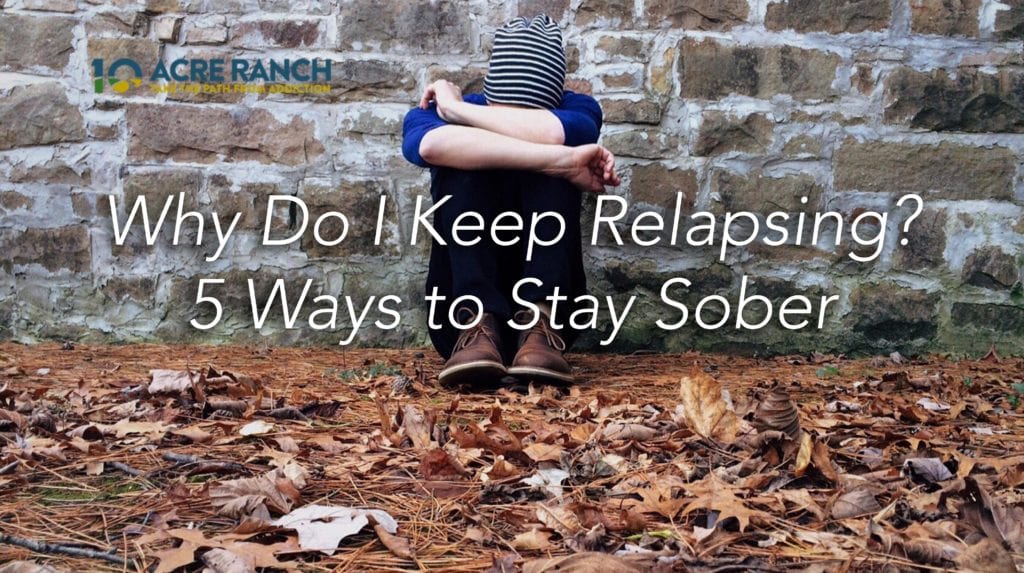
If you find yourself asking this question, either for yourself, a family member, loved one, neighbor or coworker just understand that a relapse is a very normal part of recovery. If you have been through a successful addiction treatment program, experienced a period of sobriety and fell into a relapse, please know you are not alone. Relapses are not uncommon and it does not mean you are a failure. Hope is always an option and there are many resources that can help you. How you react to your situation after experiencing a relapse is critical in your overall road to recovery. In this crucial time, forgiveness is an important factor to express to yourself or your loved one. Learn to forgive yourself or your family member for the
recent relapse into substance use. This is a better, more productive attitude to have that in the long run will help you or your loved one keep striving to maintain their sobriety.
“Treatment of chronic diseases involves changing deeply rooted behaviors, and relapse doesn’t mean treatment has failed.”–National Institute on Drug Abuse (NIDA)
It is estimated that 40-60 percent of people who maintain sobriety through rehab, treatment and recovery will relapse into heavy use, while 70-90 percent will relapse and use again at least once. In the medical field, a relapse used to be treated as an uncommon thing but that has largely changed due to the advances in behavioral science and addiction therapy. Sadly, many addicts are stigmatized by society as hopeless drug fiends or treated with the perception that they are a bad person for their substance use. Many of us here in the addiction treatment industry are advocating a different perspective. With addiction being a curable disease, you could compare it to the relapse rates of people with other medical problems such as diabetes, high blood pressure or asthma. The rate of relapse into these common medical diseases is close to the same as for people with a

substance abuse disorder. Treating this as a medical condition will help ease the stigma associated with drug and alcohol abuse. As we have seen the overdose epidemic explode in the United States, it is important for us to begin treating this as a serious medical condition, not a criminal activity reserved only for the ‘bad people’ in society. As you are reading this now, most of us know someone dearly who has struggled with some form of substance abuse. While we look to help those closest to us, deep down inside we know there is still a good person underneath the surface of their drug or alcohol addiction.
It is estimated that nearly 72,000 people in the United States died from a drug overdose in 2017. That’s close to 200 people each and every day. – Centers for Disease Control (CDC)

Warning: Your Drug Tolerance Levels Will Change
It is extremely important to note here that many who relapse will overdose their first time because they think they can do as much of the drug as they had been doing before they went through detox and a period of sobriety. Simply put, your body cannot handle as large an amount of the drug, even though they had built up a tolerance over their period of substance abuse. Your tolerance has changed through recovery and you might not be able to handle the “usual dose” as you have in the past and immediately die.
We cannot stress this enough, so please keep this in mind throughout your post-recovery stage as most people do not plan to have a relapse. Ultimately, it is up to the individual in recovery to actively want to change things in their life to help them maintain their newfound sobriety. This is a difficult path to navigate and there are many things you can do to help you avoid the temptation to relapse into substance use.
Specific Risks to Avoid During Your Process of Recovery:
- Avoid drug-related ‘triggers’: Many in recovery can be tempted to relapse if they are around old hangouts where they used to purchase or consume drugs or alcohol. Even the sight of drug paraphernalia or a drink can be too much to handle for some. Also known as drug-related cues, these thoughts can come from a variety of places, depending on your individual situation. Most treatment programs will help you identify your potential triggers and help you formulate a plan to avoid them.
- Be extra cautious during the first 90 days: Most relapses occur during this crucial period of recovery. Your addiction doesn’t simply stop once your detox is completed. For many, addiction can shape your thoughts and behaviors for the rest of your life. The good news is the longer you stay sober, the easier it will be for you to avoid a return to your past substance abuse.
- Find help in a structured environment: Rates of relapse are much lower for people who participate in some sort of organized support group after their drug or alcohol detox. Relapse prevention or twelve-step programs like Alcoholic’s Anonymous (AA) or Narcotics Anonymous (NA) are great at helping people maintain their sobriety and offer personal help when you feel the urge to use again.
- Start creating healthy lifestyle habits: Studies have shown that even a mild amount of exercise can help reduce cravings and withdrawal symptoms for recovering addicts. Eating healthy foods and thinking healthy thoughts are important to developing and rebuilding the self-confidence necessary to maintain your sobriety. Controlling your emotions and developing healthy coping mechanisms to deal with difficult situations can greatly increase your success in recovery and sober living.
- If you do relapse, don’t be afraid to ask for help (again): When a relapse occurs, know that there are a multitude of resources willing and able to help you break the cycle of your addiction. Sometimes treatment needs to be tried several times before the patient is fully recovered. Remember, relapse is completely normal and nothing to be ashamed about. Your family and loved ones will be happy you were honest and asked for help. Repeated attempts will work eventually and it will help you develop the desire for a healthy, sober lifestyle.






